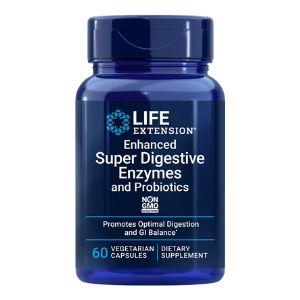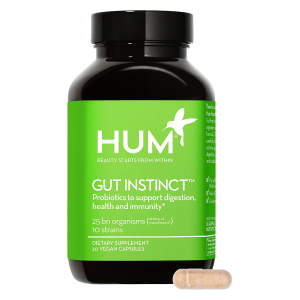5 Best Probiotic For Bloating In 2024 To Heal Your Digestion
All articles are produced independently. When you click our links for purchasing products, we earn an affiliate commission. Learn more about how we earn revenue by reading our advertise disclaimer.
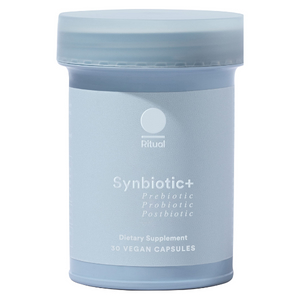
Ritual Synbiotic+
- Vegan
- Made with prebiotics, probiotics, and a postbiotic
- Third-party tested
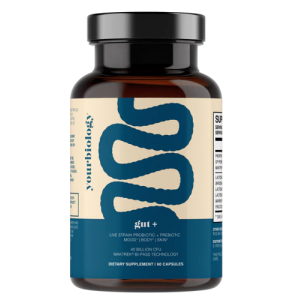
YourBiology Gut+ Probiotic
- Made with clinically-proven strains
- Includes prebiotic fiber
- May have a higher survival rate than other probiotics
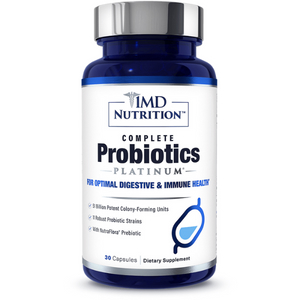
1MD Complete Probiotics
- Features bacterial strains that may support weight loss
- Includes prebiotics and probiotics
- Potency guaranteed through expiration
An estimated 10-25%[1] of otherwise healthy adults experience occasional bloating, a condition where you feel pressure, tightness, or fullness in your belly.
While it is essential to get checked out by a medical professional to receive a proper diagnosis and treatment, several home remedies and supplements can reduce bloating.
One possible solution is probiotics, which are live microorganisms intended to improve or maintain the balance of the “good bacteria” in the body. Probiotics are found in yogurt and other fermented foods, as well as in dietary supplements.
This article will discuss how probiotics can reduce bloating, the common causes of bloating, and the best probiotic to ease your symptoms. It will also explore other natural ways to alleviate bloating.
Best Probiotics For Bloating On The Market In (April. 2024)
- Ritual Synbiotic+ – Editor’s Choice
- YourBiology Gut+ Probiotic – Best Women’s Probiotic for Bloating and Gas
- 1MD Complete Probiotics Platinum – Best for Weight Loss
- Life Extension Enhanced Super Digestive Enzymes and Probiotics – Best for Digestion
- HUM Nutrition Gut Instinct – Best Quality
What Causes Bloating?
Bloating occurs when your gastrointestinal (GI) tract is filled with air or gas. It is often caused by certain foods[2], such as those high in fiber or fat, dairy products, and sugar alcohol. Bloating can also be caused by[3] constipation, overeating, acid reflux, and eating too fast.
In some cases, bloating may signal an underlying medical condition[3], including
- Diverticulitis
- Crohn’s disease or ulcerative colitis (two forms of inflammatory bowel disease, of IBD)
- Irritable bowel syndrome (IBS)
- Pelvic inflammatory disease (PID)
- Liver disease
- Infection
- Cancer
- Intestinal obstruction (bowel blockage)
Regardless of the cause, bloating can be painful and uncomfortable. Pain nerves in the GI tract only respond to distension. Therefore, anything that distends the tissue will hurt.
5 Best Probiotics For Bloating To Try In 2024
Ritual Synbiotic+
Ritual Synbiotic+ includes prebiotics, probiotics, and a postbiotic, which can improve bloating and support a healthy gastrointestinal tract.
- Vegan
- Features clinically-proven bacterial strains
- Third-party tested
- Includes prebiotics, probiotics, and a postbiotic
- Subscription required
Ritual Synbiotic+ is a three-in-one gut health supplement that includes prebiotics, probiotics, and a postbiotic to support a healthy, balanced gut microbiome.
Each vegan capsule contains 11 billion colony-forming units (CFUs), guaranteed until expiration. It also features the well-studied probiotic strains Bifidobacterium animalis subsp. (subspecies) Lactis (BB-12®) and Lactobacillus rhamnosus (LGG®).
One 2015 study[4] looked at the effectiveness of BB-12® on healthy individuals with infrequent bowel movements and abdominal discomfort. Researchers found that four weeks’ supplementation with BB-12® improved bowel regularity.
Another 2022 review of studies[5] explored the combination of Lactobacillus rhamnosus and Bifidobacterium animalis subsp. Lactis may improve bloating, gas, abdominal pain, and constipation by as much as 30% in individuals with inflammatory diseases that are characterized by complex GI symptoms.
Synbiotic+ features PreforPro®, a blend of prebiotics that stimulates the growth of beneficial gut bacteria. Studies[6] suggest that PreforPro® may improve unpleasant GI symptoms and enhance the effectiveness of probiotics.
Lastly, Synbiotic+ includes the postbiotic[7] butyrate, a short-chain fatty acid that supports immune and gut health.
Synbiotic+ is third-party tested for contaminants, but it is not certified by a well-respected third-party organization, such as the United States Pharmacopeia (USP), which tests for potency, purity, and performance. Many other products sold by Ritual are USP certified, though.
YourBiology Gut+ Probiotic
YourBiology Gut+ Probiotic is a probiotic blend designed to support women’s gut health. It includes several probiotic strains clinically proven to reduce bloating in some women.
- Made with clinically-proven bacterial strains
- Includes probiotics and prebiotics
- Designed for women
- Lacks third-party testing
- Limited brand information available
YourBiology Gut+ Probiotic is a probiotic blend that claims to help improve digestion, boost energy and focus, alleviate stress, and improve immunity.
Each two-capsule serving delivers 40 billion CFU of probiotic bacteria from four live bacterial strains, including Lactobacillus acidophilus, Bifidobacterium lactis, Lactobacillus plantarum, and Lactobacillus paracasei.
Studies[8] suggest that Lactobacillus plantarum may support a healthy immune system and treat Clostridioides difficile- (C. diff-) associated diarrhea. It also may help ease common IBS symptoms[9], especially bloating and abdominal pain.
Furthermore, one older 2012 study[9] found that Lactobacillus paracasei may help alleviate bloating and abdominal pain when combined with a high-fiber diet in individuals with diverticular disease.
YourBiology Gut + Probiotic also includes prebiotic fiber to help nourish probiotic bacteria once it reaches your intestines.
Lastly, Gut + Probiotic features patented MAKtrek® Bipass Technology from brown seaweed, which, according to YourBiology, shields the bacteria from stomach acid until it is in the small intestine, where it provides the most benefit. However, there do not appear to be any peer-reviewed studies supporting these benefits.
YourBiology does not provide information on whether this probiotic has been tested by a third party to ensure potency and purity. However, the company does offer a 100% satisfaction, 60-day money-back guarantee.
1MD Complete Probiotics Platinum
Featuring probiotic strains that may aid in body fat reduction and improve bloating, 1MD Nutrition Complete Probiotics Platinum is one of the best probiotics for bloating and weight loss.
- May aid in belly fat reduction
- Features probiotics and prebiotics
- Potency guaranteed through expiration
- Lacks third-party testing
1MD’s Nutrition Complete Probiotics Platinum comprises 51 billion CFUs and a blend of 11 probiotic strains. It also contains Nutraflora prebiotic fiber to help feed the beneficial bacteria.
1MD Complete Probiotics Platinum is designed to support digestive and immune health, but it may also support weight loss and reduce bloating.
This probiotic supplement contains well-researched Lactobacilli strains such as Lactobacillus gasseri, Lactobacillus acidophilus, and Lactobacillus rhamnosus. It also contains Bifidobacterium strains, including Bifidobacterium longum and Bifidobacterium lactis.
Bifidobacterium lactis and Lactobacillus acidophilus, in particular, may help improve bloating[10] in people with functional bowel disorders, such as IBS.
Additionally, one 2013 study[11] that looked at 210 individuals with high amounts of abdominal fat observed that taking Lactobacillus gasseri for 12 weeks resulted in reductions in waist size, hip circumference, body mass index (BMI), and fat around organs. Study participants also experienced up to an 8.5% reduction in belly fat.
While 1MD states that all products undergo rigorous testing, this product does not appear to be third-party tested. However, all products sold by 1MD are made in compliance with Good Manufacturing Practices[12] (GMP) currently established by the FDA.
If you are unhappy with your probiotic supplement, 1MD offers a generous 90-day money-back guarantee.
Life Extension Enhanced Super Digestive Enzymes and Probiotics
Life Extension Enhanced Super Digestive Enzymes and Probiotics combines a blend of digestive enzymes with probiotics to support optimal digestion and GI balance.
- Third-party tested
- Affordable
- Includes digestive enzymes and probiotics
- CFUs verified at the time of manufacture, not expiration
Life Extension Enhanced Super Digestive Enzymes and Probiotics are made with vegetarian-friendly digestive enzymes and 1 billion CFUs of the clinically studied probiotic strain Bacillus coagulans MTCC5856 (B. coagulans).
Studies[13] suggest that treatment with Bacillus coagulans MTCC5856 can significantly improve symptoms of IBS, such as diarrhea, vomiting, diarrhea, bloating, and abdominal pain.
This product contains ten digestive enzymes, including bromelain, lipase, protease, and lactase. Digestive enzymes are substances that help us digest food by breaking large, complex molecules that make up fats, proteins, and carbohydrates into smaller ones. This allows the nutrients from food to be more easily absorbed by your body.
One small study[14] carried out on individuals with diarrhea-predominant IBS found that a pancreatic lipase supplement significantly improved cramping, bloating, urge to defecate, pain, stomach rumbling, and loose stools when compared to a placebo.
Life Extension utilizes third-party testing to confirm and document product potency and purity. Product Certificates of Analysis (COA) that summarize all third-party tests performed are available to customers upon request.
If you are unhappy with your product, you can return your purchase within 12 months for a replacement or store credit.
HUM Nutrition Gut Instinct
Hum Nutrition Gut Instinct is a high-quality probiotic supplement free of unnecessary ingredients and includes well-researched probiotic strains that may help relieve bloating.
- Clean Label Project certified
- Vegan
- Team of dietitians on staff
- Includes ten probiotic strains
- Potency is measured at the time of manufacture, not expiration
HUM Nutrition is known for its high-quality supplements that have been clinically formulated by a team of registered dietitians.
HUM Gut Instinct is a vegan probiotic that contains 25 billion CFUs from ten strains of probiotic bacteria from the Bifidobacterium and Lactobacillus families.
Gut instinct features well-researched probiotic strains, such as Bifidobacterium lactis and Lactobacillus acidophilus, which may improve bloating[10].
Like other supplements sold by HUM Nutrition, Gut Instinct is free of gluten, artificial colors, genetically modified organisms (GMOs), and artificial sweeteners. It has also been certified by Clean Label Project, a third-party organization that tests products for contaminants, including antibiotic residues, lead, mercury, glyphosate, and more.
Based on an in-house survey of 83 individuals who consumed Gut Instinct daily for three months, 90% were satisfied or very satisfied with their results.
If you need help selecting the appropriate products, the company offers free access to a team of registered dietitians.
Though Gut Instinct does not require refrigeration as long as it’s stored in a cool, dry place, HUM suggests refrigerating it after opening to maintain its potency.
How To Use Probiotics To Heal Bloating?
Probiotics appear to be beneficial for abdominal bloating, especially in those with functional GI disorders, such as IBS.
According to the World Gastroenterology Organization Global Guidelines[15], improvements in abdominal pain and bloating have been seen in individuals with IBS who consumed 4 billion CFU twice daily.
Strains that appear to be most effective[15] at improving abdominal pain and bloating in those with IBS include
- Lactobacillus delbrueckii subsp. bulgaricus LBY-27
- Lactobacillus acidophilus LA-5®
- Lactobacillus animalis subsp. lactis BB-12®
- Streptococcus thermophilus STY-31
However, more research is needed to determine which species, strains, or combinations of probiotics are most effective.
Additionally, the National Institutes of Health[16] does not acknowledge any relationship between probiotics and bloating.
While probiotics are generally safe for most healthy adults, those with a weakened immune system, severe illness, or recovering from surgery should avoid using probiotics unless otherwise advised by their healthcare provider. In these populations, although very rare, probiotics have been associated with an increased risk of infection[17], especially fungi.
Choosing The Best Probiotic To Help With Bloating
When choosing the best probiotics to alleviate bloating and improve the health of your gut microbiome, there are a few things you’ll want to keep in mind.
Bacterial Strains
Different probiotic supplements often contain different strains of bacteria. Some are more effective than others for treating specific health conditions.
Furthermore, a probiotic that isn’t the right fit for you may actually cause gas and bloating.
This makes it essential to select a probiotic that includes bacterial strains with clinical evidence demonstrating its effectiveness in treating your symptoms.
Generally speaking, probiotic strains from the Lactobacillus and Bifidobacterium genera have the most research[18] to support their ability to improve gut health.
CFUs
The amount of CFUs in your probiotic supplements indicates the number of bacterial cells in each dose.
While high-potency probiotics may seem appealing at first glance, research[19] suggests higher CFU counts do not necessarily mean a probiotic will be more effective. With that said, the minimum recommended daily dose[20] is between 100 million and 1 billion CFUs per day.
Lastly, the International Scientific Association for Probiotics and Prebiotics[17] suggests avoiding probiotics stating the number of CFU at the time of manufacture. This is because it does not consider the decline in CFUs during storage. The important number is the number of CFU survival at expiration.
Ingredients
Some probiotics are formulated with other ingredients, such as digestive enzymes and pre- and postbiotics, that may enhance their effectiveness.
Synbiotics containing prebiotics and probiotics may have more benefits[21] because they work synergistically in the digestive tract by preventing the growth of harmful bacteria and promoting the growth of beneficial bacteria, thus restoring the balance of good and bad bacteria in the gut.
Be sure to carefully read the product label and avoid probiotic supplements with unnecessary additives, fillers, and artificial ingredients, which may affect your health.
Third-Party Testing
Like all dietary supplements, probiotics are not regulated by the United States Food and Drug Administration (FDA). This means it’s important to look for third-party certification.
Third-party testing helps to ensure the product contains what it says it does and that it’s free of harmful ingredients, such as heavy metals, e.g., lead).
Alternative Ways To Reduce Bloating
In addition to taking a probiotic supplement to reduce bloating and digestive discomfort, there are other steps you can take to ease your symptoms.
Remedies[22] to reduce bloating symptoms and support digestive health include
- Avoid carbonated drinks or chewing gum
- Limit foods that are high in fructose or sorbitol
- Stop smoking
- Avoid alcohol
- Limit your intake of salt[23]
- Avoiding gas-producing foods, such as turnips, Brussels sprouts, beans, cabbage, and lentils
- Chew your food well
- Applying a heating pad to the stomach to help relax the muscles in the gut, allowing gas to pass through the intestines
- Treating underlying issues, such as constipation
Certain over-the-counter medications, such as simethicone and activated charcoal, may also help. Simethicone breaks up gas bubbles in the gut and prevents bubble formation.
One 2017 study[24] found that individuals who consumed a mixture of simethicone and activated charcoal daily experienced significant improvements in abdominal pain when taking antibiotics. However, more research is needed before activated charcoal can be routinely recommended to treat bloating.
Final Thought
In addition to making diet and lifestyle changes, probiotics seem to be effective at relieving bloating, gas, and other digestive issues — especially in individuals with a disturbance in bowel function.
If you are considering probiotics, it’s a good idea to consult a healthcare provider to help determine if you should take a probiotic. They can also help you choose the best bacterial strain and dose for your health concerns.
Frequently Asked Questions
If you are experiencing gas, bloating, or bowel irregularity, you may benefit from a probiotic supplement.
Ritual Synbiotic+, YourBiology Gut + Probiotic, 1MD Complete Probiotic, Life Extension Enhanced Super Digestive Enzymes and Probiotics, and Hum Gut Instinct are among the best probiotics for bloating.
Most healthcare professionals suggest taking probiotics every day. However, it’s important to talk with your healthcare provider before taking any supplement or making any significant dietary changes.
The amount of time a probiotic takes to work will vary from one person to the next. Some people may experience improvements within a few days, while others may notice improvements after several months.
+ 24 sources
Health Canal avoids using tertiary references. We have strict sourcing guidelines and rely on peer-reviewed studies, academic researches from medical associations and institutions. To ensure the accuracy of articles in Health Canal, you can read more about the editorial process here
- Cleveland Clinic. (2021). Bloated Stomach: Causes, Tips to Reduce & When to be Concerned. [online] Available at: https://my.clevelandclinic.org/health/symptoms/21740-bloated-stomach.
- and, D. (2022). Eating, Diet, & Nutrition for Gas in the Digestive Tract. [online] National Institute of Diabetes and Digestive and Kidney Diseases. Available at: https://www.niddk.nih.gov/health-information/digestive-diseases/gas-digestive-tract/eating-diet-nutrition.
- familydoctor.org editorial staff and Rice, A. (2021). Bloating – Bloated Stomach – What Causes Bloating? | familydoctor.org. [online] familydoctor.org. Available at: https://familydoctor.org/condition/bloating/.
- Eskesen, D., Jespersen, L., Michelsen, B., Whorwell, P.J., Müller-Lissner, S. and Morberg, C.M. (2015). Effect of the probiotic strainBifidobacterium animalissubsp.lactis, BB-12®, on defecation frequency in healthy subjects with low defecation frequency and abdominal discomfort: a randomised, double-blind, placebo-controlled, parallel-group trial. British Journal of Nutrition, [online] 114(10), pp.1638–1646. doi:10.1017/s0007114515003347.
- Ceccherini, C., Daniotti, S., Bearzi, C. and Re, I. (2022). Evaluating the Efficacy of Probiotics in IBS Treatment Using a Systematic Review of Clinical Trials and Multi-Criteria Decision Analysis. Nutrients, [online] 14(13), p.2689. doi:10.3390/nu14132689.
- Grubb, D.S., Wrigley, S.D., Freedman, K.E., Wei, Y., Vazquez, A.R., Trotter, R.E., Wallace, T.C., Johnson, S.A. and Weir, T.L. (2020). PHAGE-2 Study: Supplemental Bacteriophages Extend Bifidobacterium animalis subsp. lactis BL04 Benefits on Gut Health and Microbiota in Healthy Adults. Nutrients, 12(8), p.2474. doi:10.3390/nu12082474.
- Żółkiewicz, J., Marzec, A., Ruszczyński, M. and Feleszko, W. (2020). Postbiotics—A Step Beyond Pre- and Probiotics. Nutrients, [online] 12(8). doi:10.3390/nu12082189.
- Kaźmierczak-Siedlecka, K., Daca, A., Folwarski, M., Witkowski, J.M., Bryl, E. and Makarewicz, W. (2020). The role of Lactobacillus plantarum 299v in supporting treatment of selected diseases. Central-European Journal of Immunology, [online] 45(4), pp.488–493. doi:10.5114/ceji.2020.101515.
- Ducrotté, P. (2012). Clinical trial:Lactobacillus plantarum299v (DSM 9843) improves symptoms of irritable bowel syndrome. World Journal of Gastroenterology, [online] 18(30), p.4012. doi:10.3748/wjg.v18.i30.4012.
- Ringel-Kulka, T., Palsson, O.S., Maier, D., Carroll, I., Galanko, J.A., Leyer, G. and Ringel, Y. (2011). Probiotic Bacteria Lactobacillus acidophilus NCFM and Bifidobacterium lactis Bi-07 Versus Placebo for the Symptoms of Bloating in Patients With Functional Bowel Disorders. Journal of Clinical Gastroenterology, [online] 45(6), pp.518–525. doi:10.1097/mcg.0b013e31820ca4d6.
- Kadooka, Y., Sato, M., Ogawa, A., Miyoshi, M., Uenishi, H., Ogawa, H., Ikuyama, K., Kagoshima, M. and Tsuchida, T. (2013). Effect of Lactobacillus gasseri SBT2055 in fermented milk on abdominal adiposity in adults in a randomised controlled trial. British Journal of Nutrition, [online] 110(9), pp.1696–1703. doi:10.1017/s0007114513001037.
- Center (2021). Facts About the Current Good Manufacturing Practices (CGMPs). [online] U.S. Food and Drug Administration. Available at: https://www.fda.gov/drugs/pharmaceutical-quality-resources/facts-about-current-good-manufacturing-practices-cgmps.
- Majeed, M., Nagabhushanam, K., Arumugam, S., Majeed, S. and Ali, F. (2018). Bacillus coagulans MTCC 5856 for the management of major depression with irritable bowel syndrome: a randomised, double-blind, placebo controlled, multi-centre, pilot clinical study. Food & Nutrition Research, [online] 62(0). doi:10.29219/fnr.v62.1218.
- Money, M.E., Walkowiak, J., Virgilio, C. and Talley, N.J. (2010). Pilot study: a randomised, double blind, placebo controlled trial of pancrealipase for the treatment of postprandial irritable bowel syndrome-diarrhoea. Frontline Gastroenterology, [online] 2(1), pp.48–56. doi:10.1136/fg.2010.002253.
- World Gastroenterology Organisation (WGO). (2017). World Gastroenterology Organisation (WGO). [online] Available at: https://www.worldgastroenterology.org/guidelines/probiotics-and-prebiotics/probiotics-and-prebiotics-english.
- NCCIH. (2012). Probiotics: What You Need To Know. [online] Available at: https://www.nccih.nih.gov/health/probiotics-what-you-need-to-know.
- Nih.gov. (2018). Office of Dietary Supplements – Probiotics. [online] Available at: https://ods.od.nih.gov/factsheets/Probiotics-HealthProfessional/.
- Mohajeri, M.H., Brummer, R.J.M., Rastall, R.A., Weersma, R.K., Harmsen, H.J.M., Faas, M. and Eggersdorfer, M. (2018). The role of the microbiome for human health: from basic science to clinical applications. European Journal of Nutrition, [online] 57(S1), pp.1–14. doi:10.1007/s00394-018-1703-4.
- Nih.gov. (2022). Office of Dietary Supplements – Probiotics. [online] Available at: https://ods.od.nih.gov/factsheets/Probiotics-Consumer/.
- Lye, H.S., Balakrishnan, K., Thiagarajah, K., Mohd Ismail, N.I. and Ooi, S.Y. (2016). Beneficial Properties of Probiotics. Tropical Life Sciences Research, [online] 27(2), pp.73–90. doi:10.21315/tlsr2016.27.2.6.
- Gyawali, R., Nwamaioha, N., Fiagbor, R., Zimmerman, T., Newman, R.H. and Ibrahim, S.A. (2019). The Role of Prebiotics in Disease Prevention and Health Promotion. Dietary Interventions in Gastrointestinal Diseases, [online] pp.151–167. doi:10.1016/b978-0-12-814468-8.00012-0.
- Medlineplus.gov. (2021). Abdominal bloating: MedlinePlus Medical Encyclopedia. [online] Available at: https://medlineplus.gov/ency/article/003123.htm.
- Peng, A.W., Juraschek, S.P., Appel, L.J., Miller, E.R. and Mueller, N.T. (2019). Effects of the DASH Diet and Sodium Intake on Bloating: Results From the DASH–Sodium Trial. American Journal of Gastroenterology, [online] 114(7), pp.1109–1115. doi:10.14309/ajg.0000000000000283.
- Melchior, C., Gourcerol, G., Bridoux, V., Ducrotté, P., Quinton, J.-F. and Leroi, A.-M. (2017). Efficacy of antibiotherapy for treating flatus incontinence associated with small intestinal bacterial overgrowth: A pilot randomized trial. PLOS ONE, [online] 12(8), p.e0180835. doi:10.1371/journal.pone.0180835.

